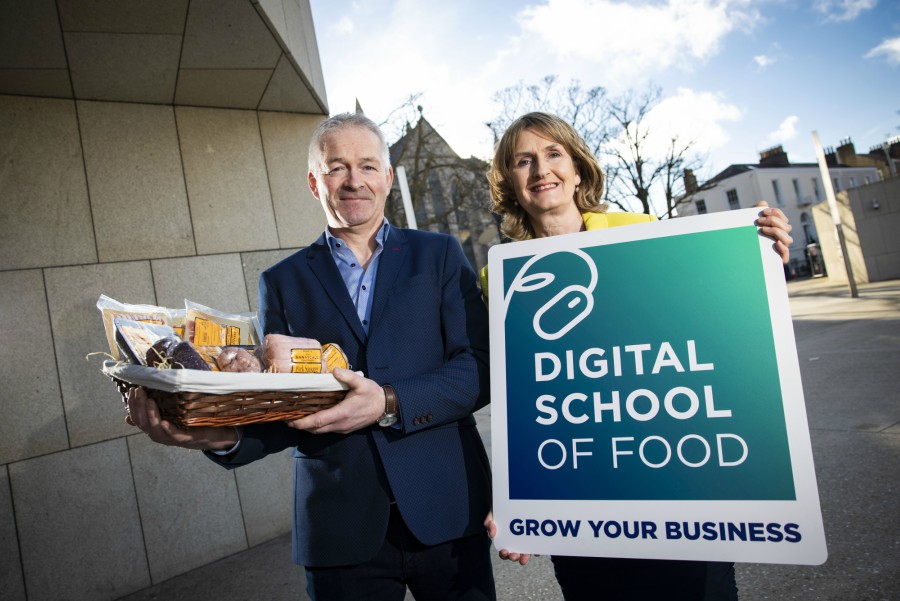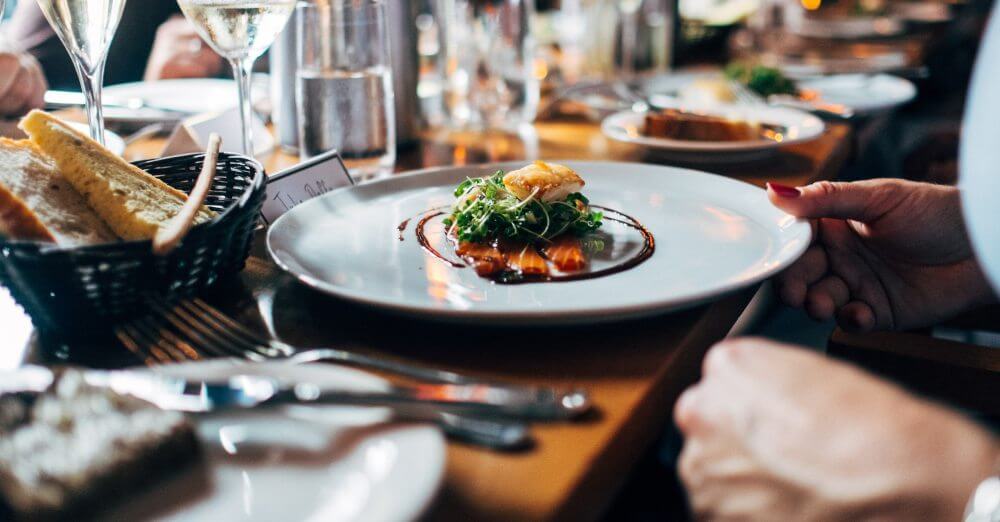Podcast Ep 182: The purity of ingredients going into Irish food and drinks means the sector is now a world leader for quality. We talked to artisan producers and industry leaders at Blas na hEireann in Dingle to discover the future of Irish food.
Tucked in off Green Street in the elegant Kerry town of Dingle a revolution was happening. As revolutions go, it has been a slow burner but one that gains momentum with every year as the quality of Irish food gets recognised and the optimism and creativity of entrepreneurs in the sector from every corner of Ireland get their moment to shine.
Indeed the sun did graciously shine for at least one day of the Blas na hEireann event, now in its 16th year, as artisans and industry buyers mingled to discuss the business of food and how to embrace trends such as social media and more to help grow the sector.
“The idea for it was because I was a food producer and I was discussing the fact that we had to go abroad for accreditation and that there were no Irish accreditations or Irish food awards and yet we have the best producers. And so, as an Irish solution to an Irish problem, I started it myself”
Under an azure sky, ‘Blas’ as it is known hammered out a roll call of winners from every conceivable field of food and drink across 150 categories from butter to beer and bread to bacon were named. More than 3,000 food businesses vied for the coveted Blas badge they could put on their products.
The flavours of Ireland
For former fisherman Artie Clifford, the awards were conceived as a way to recognise what Irish food producers were doing.
“The idea for it was because I was a food producer and I was discussing the fact that we had to go abroad for accreditation and that there were no Irish accreditations or Irish food awards and yet we have the best producers.
“And so, as an Irish solution to an Irish problem, I started it myself.”
The first Blas awards had 400 entries for 36 categories and Clifford himself seems amazed how it has grown to 3,000 entries for 150 categories. The key to it he, says, is in the rigor and purpose of the awards.
“The judging takes about six weeks,” he explains, pointing out how the process came about after consulting with UCC as well as a university in Copenhagen. “We wanted to design a judging system that is multi-category using blind sensory analysis. So everything about the product is stripped away and the product is scored objectively and subjectively on things like appearance, aroma, texture, flavour, overall satisfaction and mass appeal.”
As well as bringing the industry together every year, Clifford says what provides the most satisfaction is the recognition in Ireland for the Blas symbol that winners are entitled to emblazon on their packaging. “It’s growing. The most recent survey showed that 80% of all shoppers recognise the symbol and 72% think it will influence their purchase.”
We spoke to Lucy Ryan, head of Food & Drink Sector at Bank of Ireland about the potential for Irish artisan producers to grow. “There’s an incredible number of small producers that start out and I suppose what many of the Government support agencies, the bank and others need to do is actually help support and encourage them to scale up more.
“The breadth and variety of foods has become even more impressive, everything from making mozzarella in Ireland was something unheard of 10 years ago to now we’re making vermouth and salami. It’s absolutely incredible. In the last few years people have really tapped into good quality food. Covid really brought home to people how they really wanted real quality, locally produced food and ultimately sustainable food, which we are going to have to be producing over the next few decades as the population grows. Sustainable food is what it is all about, but tasty, sustainable and nutritious food is where the general trend is going. That’s probably the overarching trend within the food industry, and Ireland is no exception to that.”
Food and drinks entrepreneurs
What makes Blas na hEireann special is the food entrepreneurs who are brimming with passion and ambition. We spoke to the founders of Velo Coffee Roasters Rob Horgan and Suzanne Casey who spoke about how the coffee roastery has become a global export phenomenon having started as a coffee shop in Cork several years ago.
“Everything in the café was locally sourced, except for our coffee,” recalls Horgan. “We started to look at what was involved in roasting good coffee, not with the idea of doing, but I came out of my dungeon one say and said to Suzanne ‘I think we can do this ourselves.’ And the rest is history. We went to Germany and got trained up in roasting. In October 2017 this monstrosity of a machine arrived in the back of a truck from Germany and off we went.”
Discerning coffee buyers in Ireland will have noticed and most likely have indulged in Velo’s products in Aldi as well as Tesco and Dunnes Stores. Casey said that joining Aldi’s Food Academy gave the founders the confidence to go into retail. “Retail is where we thought we could see the most amount of growth. It’s slower, it takes longer, but we’ve really started to see it pay off from our growth in Tescos, Dunnes and some of the Super-Valu stores as well.”
Horgan says the future for Velo is to continue to grow locally in retail but focus on exports. “The most important thing to do is maintain those customers who have been really supportive of us and the consumers in their shops. Suzanne and myself we’ve spent the last couple of years working hard on ensuring that we’re doing everything right and minding them. And, with an eye on exports. We’re optimistic that by the end of this year we’ll have a proper export customer on a daily basis. We’ve exported to 56 different countries.”
Next we spoke with Annie Dunne, founder of The Art of Grate Food and a former buyer from Harrods who can attest to the quality of Irish food and how it competes with the best in the world.
“Our heritage in quality food has long been here. We have some fantastic ingredients that allow this quality to shine through.”
Dunne says the innovative nature of Irish food producers needs to be appreciated. “We’re doing things very differently to other markets. We’re exploring new areas of how to improve the way in which we present products to consumers. And we are in the health and wellbeing space very much so in terms of how we were brought up, with traditional ways of producing and making food and that’s very much a global trend. But actually Ireland has always had that. And we’ve never really lost it. And now we’re playing to one of our strengths that has always been there.”
The business of food
The business of food is booming and the potential for creating jobs in the regions is enormous. In just 10 years Cavan and Fermanagh bakery business Crust & Crumb has grown to employ more than 1,000 people. We talk to Crust & Crumb commercial manager Mark McCaffrey about the firm’s growth.
He explained that the business is spread across six sites North and South of the border making both own-brand and private label flatbreads, pizza breads and garlic breads.
Timing was everything. “We were in the right place at the right time. We listened to our customers and what they wanted and we provided what they wanted. So now we’re growing, growing our market share and our business.”
McCaffrey said that the demand for pizza products in post-recession, post-Celtic Tiger Ireland fuelled demand for its product. “Pizza is probably known as a recession product. Secondly, we came to the market and we developed a range of products that didn’t exist and there was a need for them. We just grew from there. After that it has been pretty much down to efficiency, keeping costs low and then innovation. We managed to be a few years ahead of where the market is and then providing it to our customers.”
He said the quality of Ireland’s food products sets Irish producers apart. “You only realise that when you start exporting your products worldwide, when you start comparing benchmark and what’s in Europe, the US or even Asia or Australia.”
McCaffrey added: “From a food quality, safety and technical perspective, we’re really up there with the best.”
Purity in all its forms
For Trevis Gleason, an American writer and chef who has made Ireland his home and has authored a number of influential food books including Chef Interrupted, Dingle Dinners and Burren Dinners, the thing that makes Irish food stand out is the purity of its ingredients.
“I think it’s the purity and the excellence in the quality. And here on the penninsula, what we are really trying to do is look forward a few generations and think what are we doing with our food and our process? That’s going to affect progeny”
Gleason and his wife decided to relocate from Seattle to Dingle after falling in love with the Kerry region. “We were really enamoured with the people, particularly the food scene.
“We cobbled together a bit of funding and I told the stories of the people in the kitchens; it’s a cookery book, not of chef’s restaurant food but what they would serve in their own homes. And I told their stories, where in the world they come from and why in the world that they stay. Everyone knows the restaurants but they don’t know the characters behind the swinging doors.”
To Gleason the ingredients found in Ireland are second to none. “I can say that I have never put my hands on higher quality ingredients that would be considered just bog standard here. These are the highest quality ingredients.
“Maybe Irish cuisine going back several generations was fairly simple. But it was fairly simple because you can’t hide behind the simplest of ingredients.
“If you were to put one word to Irish cuisine – French might be rich, Italians have flavour, Spanish is spicy, but I would say ours is ‘pure’. For a chef it is what you can do with the palette, any chef can blend that into a masterpiece.
“I think it’s the purity and the excellence in the quality. And here on the peninsula, what we are really trying to do is look forward a few generations and think what are we doing with our food and our process? That’s going to affect progeny.”
Finally, we spoke Siobhan Ni Ghairbhrith, a former teacher and owner of St Tola goats cheese makers in Co Clare about how the business emerged from a neighbouring farm and the prospects for Irish food in the years to come.
“It was a brand that was established. I knew that because I had worked for Shannon development for a period of time when I took a career break from school. And I could see it was a brand that was well established and that there was more demand2, so it just kind of made sense. So then we moved the goats and we built the cheese house. And I’ve been producing St Tola on the farm now for the last 24 years.”
Siobhan believes getting behind Irish food producers is core to the future. “It is so important and getting more and more important. Food scarcity has become an issue not only in Ireland, but in the world in general, that we’re hearing all about these vegetables and fruits you can’t buy. From our own point of view, there’s a shortage of Irish goat’s milk in the country. And there’s a scarcity of organic milk.
“But when you come to Blas na hEireann, there’s a great network of people here and it’s all about Irish food – and even the name which means ‘flavours of Ireland’ –and it is so important because it is about genuine producers, and people who are passionate; if they’re not producers, they are buyers for the shops and the chefs from the restaurants. So it is getting more and more important and traceability is so important. And so there is a whole piece to be looked at around labelling and being quite clear where the ingredients of a product comes from.”





